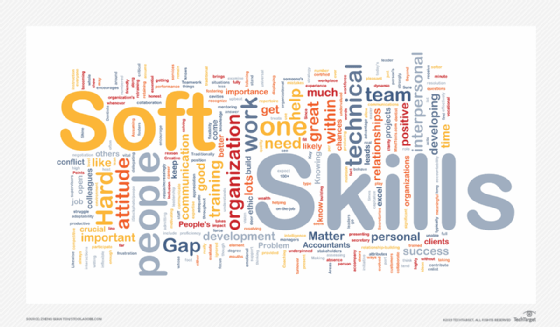What are soft skills?
Soft skills are personal attributes that support situational awareness and enhance an individual's ability to get a job done. The term soft skills is often used as a synonym for people skills or emotional intelligence. Unlike hard skills, which include a person's technical ability to perform a specifically defined task, soft skills are broadly applicable across job titles and industries. It's often said that while hard skills might get someone an interview, soft skills will help that person get and keep the job.
Business executives and leaders are making soft skills more of a priority when hiring, as they are often essential for workers to succeed in modern organizations. In 2018, LinkedIn listed leadership, communication, collaboration and time management as the top four most in-demand soft skills.
Technology company iCIMS, which develops recruiting and other employee management-related software, analyzed its proprietary data and found that problem-solving, adaptability and time management were the top three soft skills recruiters sought in candidates. Other important soft skills include adaptability, diplomacy and respect, even during disagreements.

What are the in-demand soft skills?
When employees with a high level of emotional intelligence have good communication skills and interpersonal skills, they are more likely to be able to clearly articulate goals and lead a team in a positive manner.
For businesses that have a customer service or relations component, strong soft skills are a way to ensure a positive relationship between customer and company without providing extensive training.
The following are examples of soft skills that company leaders value:
- Creativity.
- Appropriate use of humor.
- Confidence.
- Honesty.
- Integrity.
- Friendliness.
- Time management.
- Good manners.
- Enthusiasm.
- Positive attitude.
- Good listening skills.
- Attention to detail.
- Ability to grasp the big picture.
- Self-motivation.
- Common sense.
- Good decision-making.
- Empathy for others.
- Communication skills.
- Willingness to see a difficult job through to the end.
- Willingness to change direction when something isn't working.
- Ability to negotiate.
- Ability to deal with conflict gracefully.
Why are soft skills important in the workplace?
Business projects often require employees to work as a team, making employees' ability to have positive interactions with others just as valuable as the technical tasks they're asked to accomplish.
As a result, business leaders are seeking workers who possess teamwork, collaboration, communication and problem-solving skills, as well as other emotional and cognitive capabilities, to work in multimember, multidisciplinary teams that are geographically or cultural dispersed.
Soft skills training
Businesses and individuals can help close the soft skills gap through training. Individuals should start by asking family and trusted colleagues for feedback, which can help them identify the soft skills that require improvement.
Individuals can also improve their soft skills through mentoring and classes, as well as by simply observing and emulating how others successfully interact with peers and handle difficult interpersonal situations. Working with a professional coach and reading self-help books and articles can assist in this process, as well as using self-assessment tools like the Myers-Briggs personality profile test.







